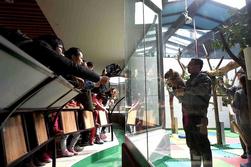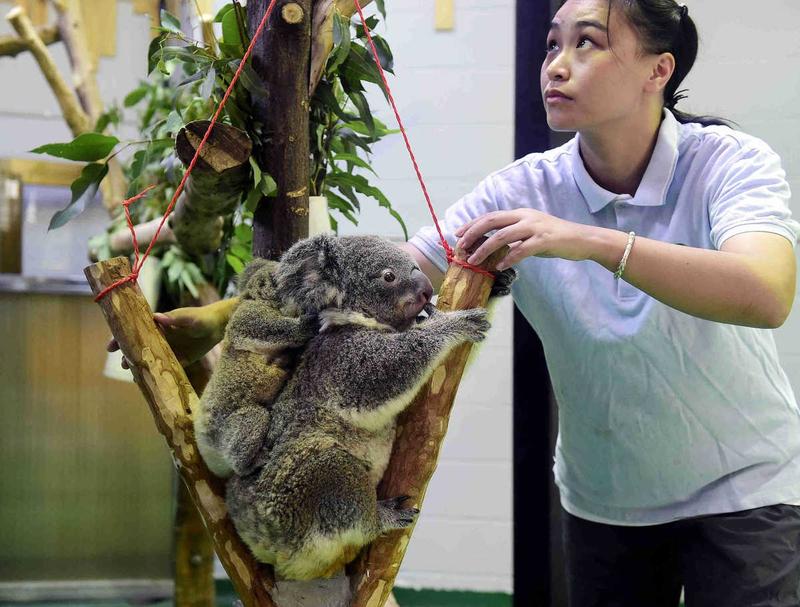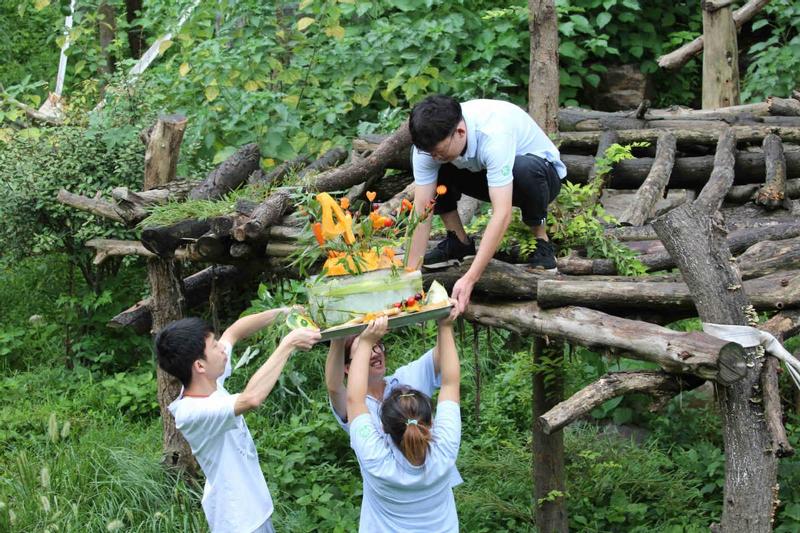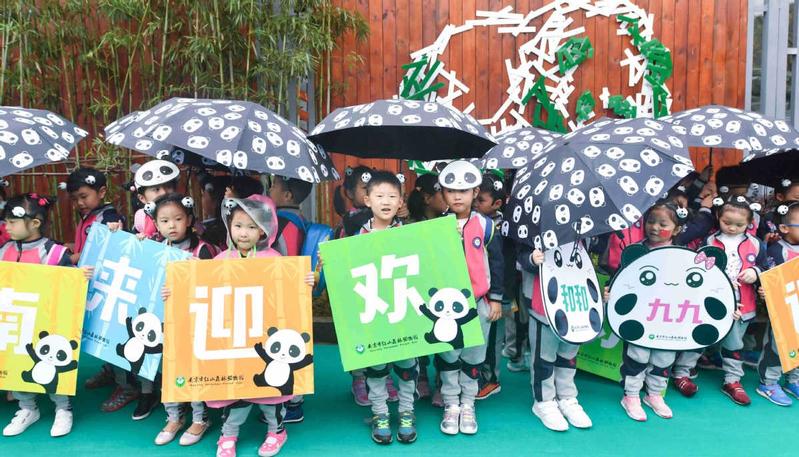 Breeders tell visitors about their work at Hongshan Forest Zoo in Nanjing, Jiangsu province. (PHOTO PROVIDED TO CHINA DAILY)
Breeders tell visitors about their work at Hongshan Forest Zoo in Nanjing, Jiangsu province. (PHOTO PROVIDED TO CHINA DAILY)
Shen Zhijun, head of Hongshan Forest Zoo in Nanjing, Jiangsu province, took to the internet unexpectedly in August to deliver a speech.
In the 30-minute address, he described how the animals were faring during the novel coronavirus pandemic and used humor to encourage people to visit the zoo.
Shen said he had heard from media reports that when the pandemic in China was controlled, there would be a wave of so-called revenge spending, but this had not turned out quite as he had expected.
"I waited (at the zoo) for more than three months, but hardly anyone came to exact revenge on me," he said.
I walked through the zoo after it was shut down. It was a sunny spring day, but all I could hear were the sounds made by the animals. It should have been a time for people to be outdoors enjoying the sunshine and for laughing children to chase one another, but there were no such scenes this spring. The silence in the zoo made me feel sad.
Shen Zhijun, Head of Hongshan Forest Zoo, Nanjing, China
In the month since his speech, there have been many changes at the zoo. The number of visitors has risen by 15 percent, with over 7,000 people attending on weekends. The zoo's online store, which used to sell about five items a day, is now coping with an influx of customers.
Items most in demand are paintings by orangutan Xiao Hei, organic fertilizers made from animal feces and a book written by Shen. Customers face a wait of several months for the orangutan's artwork because the animal paints only when he is in a good mood.
For the first time in several decades, Shen, 37, has been contacted by some of his former classmates, who told him they would visit the zoo.
At the facility, a large board has been erected bearing images of Shen and some of the animals, including an elephant, a giraffe and a giant panda. Chinese characters on the board read: "Thank you for coming to take revenge on me."
It is not the first time the zoo has attempted to attract public attention. On Feb 5, it started to livestream animals' activities and the daily work of its employees. The first sessions were broadcast less than two weeks after the zoo was closed on Jan 24 due to the pandemic.
ALSO READ: Wuhan Zoo livestreams animals during outbreak
To date, more than 13 million netizens have followed the livestreams. They watch footage of pandas staring blankly ahead, koalas sleeping all day and orangutans taking care of their family members.
Many netizens posted that watching the animals doing nothing makes them feel relaxed and comforts them. They have also seen from the broadcasts how the workers feed the animals, clean their enclosures and give them physical examinations.
Shen said: "The zoo receives about 5 million visitors a year, but through livestreaming, more people can learn about animal protection. That's the main purpose of these sessions."
After being closed for 51 days, and facing losses of more than 20 million yuan (US$2.9 million), when the zoo reopened in March, it received far fewer visitors than usual. It needs a daily income of about 200,000 yuan to operate smoothly.
READ MORE: Beijing Zoo reopens to the public after 59 days
Shen said he became anxious about the animals' welfare.
"I walked through the zoo after it was shut down. It was a sunny spring day, but all I could hear were the sounds made by the animals," he said.
"It should have been a time for people to be outdoors enjoying the sunshine and for laughing children to chase one another, but there were no such scenes this spring. The silence in the zoo made me feel sad."
Food worries
The zoo had to ask for outside help for some animals who were particularly fussy about their diets. In January, it prepared some meat, fruit and grass, but was unable to buy fresh fish and shrimp due to transportation problems-including road closures-caused by the outbreak.
Each day, the zoo needs some 24 kilograms of fresh shrimp and fish to feed its birds.
Some of the birds, such as red-crowned cranes, pelicans and flamingos, refused to eat frozen fish and shrimp and showed signs of anxiety.
Many people offered to help, with fish farmers offering free aquatic produce, which was transported to the zoo by a supermarket company.
 A koala and her baby are being weighed at Hongshan Forest Zoo in Nanjing, Jiangsu province. (PHOTO PROVIDED TO CHINA DAILY)
A koala and her baby are being weighed at Hongshan Forest Zoo in Nanjing, Jiangsu province. (PHOTO PROVIDED TO CHINA DAILY)
Food is not the only cause of concern for Shen. Since starting work at the zoo in 2008, he has improved animals' living conditions and tried to meet their psychological needs.
Nicknaming himself "King of the Animals" on social media, Shen patrolled the 68-hectare zoo almost every day in his first year, noticing that many of the animals appeared to be unhappy.
Wolves continually paced around a cage of less than 10 square meters, and the elephants just lay on a concrete surface in front of hordes of noisy camera-toting visitors.
Since starting work at the zoo in 2008, Shen has improved animals' living conditions and tried to meet their psychological needs
Shen described the animals' lives as "boring, helpless and pathetic", and set out to improve their conditions.
The elephants became the first in the country to enjoy a manicure service. Workers learned from their counterparts at Dublin Zoo in Ireland how to beautify the animals' nails, and also just how important a pool is for them.
Shen said: "I was considering abandoning the idea of building a pool for the elephants before I visited Dublin Zoo. However, I changed my mind after seeing just how comfortable the elephants in Dublin were soaking and swimming in the water."
He and his team managed to dig a pool in rocky ground and also bought a small excavator to transform the frequently-trodden area where the elephants take sand baths.
With help from Bosch Group, the German multinational engineering and technology company, and a designer from the United Kingdom, the zoo also set up two giant clover-shaped shading systems for the elephants to stay out of the sun and take baths.
To make life more interesting for the elephants, holes were dug in one of the walls of their enclosure. Fruit was placed in boxes behind the holes for the animals to discover. They have to use their trunks to remove the fruit from the holes.
 A birthday cake is prepared for some of the animals at Hongshan Forest Zoo in Nanjing, Jiangsu province. (PHOTO PROVIDED TO CHINA DAILY)
A birthday cake is prepared for some of the animals at Hongshan Forest Zoo in Nanjing, Jiangsu province. (PHOTO PROVIDED TO CHINA DAILY)
For the zoo's monkeys, more than 20 kinds of tropical plants were placed in their enclosure.
The plants must be non-poisonous and not endanger the monkeys, but sometimes the animals pose a threat to the plants by being too boisterous.
To keep them away from the plants, keepers have designed and installed new toys and equipment to distract them.
Since 2009, the zoo has renovated 19 animal enclosures, including those for wolves, koalas and tropical birds
Since 2009, the zoo has renovated 19 animal enclosures, including those for wolves, koalas and tropical birds.
It has used 3D printing technology to replace a monkey's front teeth, provided a new beak for a red-crowned crane involved in a fight with another bird, and encouraged a baby chimpanzee removed from its family after a series of disputes to reunite with it.
The animal rescue center for Jiangsu, including Nanjing, the provincial capital, the zoo is tending to about 1,000 creatures that need help. Some 60 percent of them are non-native species that will have to remain at the zoo after being treated. The remainder will be released in the wild when they recover.
An "owl school" has been opened to prepare the birds for their return to the wild. Every year, the zoo receives 60 to 70 owls from local residents, who think that the birds need help. This is despite people being told that they should not touch young owls when they see them in the wild.
However, owlets continue to arrive. The birds live together at the school, learning how to catch food after they are released.
Over the years, Hongshan Forest Zoo has become popular among animal lovers and has earned their respect for its professionalism and caring approach.
However, many social media platforms that have contacted the zoo to propose cooperation projects have been rejected. Requests included allowing the animals to be touched and for them to perform certain movements to entertain audiences.
Shen said: "This simply makes fun of the animals ... they are not here to entertain us. Wild animals have their own way of life, and the best way to respect them is to allow them to keep their lifestyles and not disturb them.
"A zoo's publicity should also be professional, provide knowledge and raise awareness of animal protection."
He added that when it comes to zoos, there are usually two schools of thought. One, that there should be no zoos, as they keep animals captive, and the other that zoos are merely places for fun. The latter results in visitors bringing food to feed the animals and banging on the walls of their enclosures to scare them.
 Kindergarten children line up to greet pandas at Hongshan Forest Zoo in Nanjing, Jiangsu province. (PHOTO PROVIDED TO CHINA DAILY)
Kindergarten children line up to greet pandas at Hongshan Forest Zoo in Nanjing, Jiangsu province. (PHOTO PROVIDED TO CHINA DAILY)
Shows banned
A total of 206 public zoos have registered as members of the Chinese Association of Zoological Gardens, which estimates that there are some 300 zoos in the country.
In 2010, the National Forestry and Grassland Administration, then known as the National Forestry Administration, issued a regulation banning shows that allowed audience members to touch or abuse animals. Three years later, the Ministry of Housing and Urban-Rural Development prohibited all kinds of animal displays.
Over the years, Hongshan Forest Zoo has become popular among animal lovers and has earned their respect for its professionalism and caring approach
However, to make a profit, some private zoos still take risks to stage such performances.
Shen said a zoo should act as a "Noah's Ark" to protect endangered species, some of which may become extinct were it not for the existence of zoos.
In China, Milu deer, also known as Pere David's deer, have been saved from extinction after being reintroduced to the country from foreign zoos.
The Przewalski's horse, or Mongolian wild horse, was also reintroduced to China from foreign zoos, before being returned to the wild in Xinjiang Uygur autonomous region.
Shen said that to protect the environment for both animals and humans, zoos should publicize the importance of habitats.
He said the creation of a tropical environment for the monkeys at his zoo is a good way to show visitors the concept and importance of habitats.
"We hope that visitors can establish an emotional connection with the animals, understand their situations and start to respect and protect nature after they come to the zoo," he added.
Guo Jun contributed to this story.


